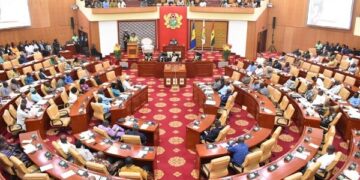The Institute for Energy Security (IES) and the Chamber for Petroleum Consumers (COPEC) have levied serious accusations against Chinese firm Sentuo Oil Refinery, claiming it has inundated the Ghanaian fuel market with substandard petroleum products, flouting national specifications and regulatory frameworks.
According to the energy think tanks, these out-of-specification products have been causing significant damage to vehicles and machinery, prompting leading oil marketing brands to grapple with containment measures, including the closure of dispensing pumps.
In a strongly worded statement, the IES and COPEC have called for an investigation by the Special Prosecutor into Sentuo Oil Refinery’s operations, citing the influx of unspecified and substandard petroleum products into the Ghanaian market.
Moreover, they urge President Akufo-Addo to accord Tema Oil Refinery (TOR) similar attention and scrutiny, especially given Sentuo’s purported lack of requisite permits and licenses.
“The IES and COPEC also call on the President [Akufo-Addo] to dedicate to the Tema Oil Refinery (TOR) the same time and energy as it is doing for Sentuo, even though it has not acquired all necessary permits and licenses to operate in the oil refinery and marketing space, resulting in out-of-specification products seeping into the Ghanaian market”.
“Finally, the IES and COPEC wish to serve notice that they will not hesitate to equally drag the Ghana Standard Authority (GSA) and the National Petroleum Authority to the law courts in the coming days if the current menace is not immediately addressed”, the think tanks noted.
The potential ramifications of Sentuo Oil Refinery’s alleged actions are alarming, with fears of widespread engine malfunctions, particularly in key regions like Greater Accra, Ashanti, and the three Northern regions. The IES and COPEC caution that failure to address this issue promptly could lead to a surge in mechanical failures and operational disruptions across various sectors.
Citing provisions within the NPA Act 2005 (Act 691), the IES and COPEC underscore the regulatory mandate of the Licensing Department to oversee the issuance of permits and licenses to Petroleum Service Providers (PSPs). However, they contend that Sentuo Oil Refinery’s operations have circumvented these regulations, casting doubt on the legitimacy of its activities.
Furthermore, the IES and COPEC lament the lack of collaboration between Sentuo Oil Refinery and the Inspection and Monitoring Department of the NPA, highlighting deficiencies in permit acquisition and facility inspections. Despite these shortcomings, the recent commissioning of the refinery by President Akufo-Addo raises questions about regulatory oversight and governance within the petroleum sector.
“In line with the provision of the NPA Act 2005 (Act 691), the Licensing Department of NPA as part of its mandates is enjoined to issue permits and licenses to various Petroleum Service Providers (PSPs) that reflect the activities covered within a specified service area, and also to maintain a register on licenses and permits issued to various categories of PSPs.
“However, the IES and COPEC can confirm that aside from the construction permit granted the Chinese Sentuo Oil refinery, no other license has been issued to warrant Sentuo to commence oil processing, trading, and marketing; in clear contravention of established national laws and acts.
Again, they pointed out that “The Sentuo Oil Refinery as IES and COPEC have it today, has failed to collaborate with the Inspection and Monitoring Department of the NPA to acquire the necessary permits, and develop the necessary checklists for the inspection of the refinery facility, yet last month the President Nana Addo Dankwa Akufo-Addo joyously proceeded to commission the refinery, even as the state oil refinery is left in its ailing and distressed state”, the IES and COPEC posited.





















































































